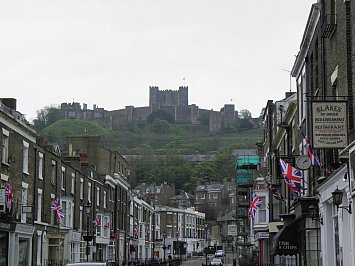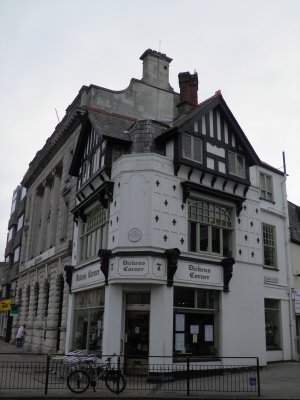Graham Reid | | 3 min read

Deep in the dark belly of Dover Castle – from which on a clear day you can see France just 35kms away – there is a place forever on the cusp of war.
Down here is where the voice of a shaky Neville Chamberlain tells the British people they are now in mortal conflict with Germany, then there is King's famous speech and Sir Winston Churchill's bulldog rumble.
I glance at headlines on newspapers from 1939 which banner this terrible history about to be wrought on the world.
Far beneath the solid stone of the castle walls above are these offices, telegraph rooms, kitchens and sleeping quarters where dozens of men and women helmed secret information into a war machine over six decades ago.
The evacuation from Dunkirk, Operation Dynamo, was planned here, when Britain turned defeat in France into a galvanising victory, of sorts.
These musty rooms and serpentine subterranean corridors were reopened in 2011 after a $5 million refit, but feel as remote from the outside world as they must always have been.
Down here was too in more recent times was a nuclear bunker for the regional government to flee into during the Cold War.
Unhappy history is at every turn in this formidable place which was started by William the Conqueror and finished by Henry II. Today, groups of players enact historical scenes in the grand halls and rooms, and period furniture offers visitors a sense of what it must have been like in these cavernous rooms, where little men in heavy armour clunked around and guards kept a watchful eye across the water.
Previous occupants here must have frequently been cold and often extremely nervous.
Dover Castle -- built over eight centuries ago on a commanding site once occupied by Romans and whose tunnels date back to the Napoleonic era -- is increasingly drawing visitors to this small corner of Britain. And sometimes even to the town below which has mostly been a place people passed through without stopping.
For decades in living memory Dover was Britain's gatehouse as passenger and vehicular ferries plied the short distance to the Continent. The town was a famous name on the map, but rarely a destination in itself. And when the Channel tunnel opened in 1994 you could leave London and never see it at all. Those famous white cliffs might be among Britain's most iconic places, but the town between them – today with a population of fewer than 40,000 – slid into neglect.
Ironically though, tourism at the castle has grown as French students come
to explore their shared history with Britain, and Germans of all ages queue to see wartime tunnels because there are few such commemorative sites in their homeland.
Dover, a frontline in war and a gateway in peace, might always be the place travellers pass by.
And it's had unfair press for centuries. In his Tour Through the Whole Island of Great Britain of 1727 Daniel Defoe wrote: “Neither Dover nor its castle has anything of note to be said of them but what is in common with their neighbours; the castle is old, useless decay'd, and serves for little . . ."
That seems unduly harsh, but of course the castle in the 18th century was not the tourist attraction it has become recently.
And frankly, if the town was good enough for James Bond to knock around in – yes, in Moonraker and Goldfinger, written by Ian Fleming while living in Noel Cowards' house on a hill – I think it's something going for it.
 Another fictional character, David
Copperfield, more down on his luck than
Another fictional character, David
Copperfield, more down on his luck than
Bond, rested on the step of a shop in the centre of town and ate some bread while looking for his aunt Betsy Trotwood. The incident is commemorated on a plaque at Dickens Corner, and the author often stayed in Dover. He worked on Great Expectations and Bleak House here.
Poets, painters and authors were drawn to compact little Dover. George Eliot lived here and thought the town "lovely under a blue sky". William Wordsworth often passed through and even wrote a couple of poems about Dover, one reads, “With increase of wonder, I have watched this sea-side Town, under the white cliff's battlemented crown . . ."
But in the lifespan of old Dover these people – fictional or real – were recent visitors.
In the excellent museum are the preserved remains of a boat discovered in nearby Townwall St in 1992. It dates back to the Bronze Age.
The museum – with some of the most life-like mannequins I've ever seen – illuminates the Roman history of this region, and is a reminder that while many have passed through, some left their footprints, thoughts, poems and stories here.
Historically, Dover may have been unloved, ignored or only seen through a porthole or a car window.
But it was always at the crossroads of history and waits quietly for you – “with increase of wonder”, as Wordsworth wrote – to discover . . .





post a comment